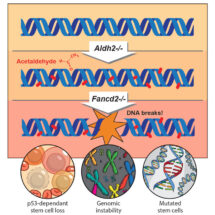
Previous work from KJ Patel’s group in the LMB’s PNAC Division revealed that aldehydes – such as acetaldehyde, a by-product of alcohol metabolism – can damage our DNA. Further research by the group showed that our cells are protected against these toxic aldehydes using a two-tier protection system: enzymes that remove these aldehydes (tier-1) and DNA repair that fixes the damage they cause (tier-2). This raised further questions regarding the type of cells that these aldehydes target and how precisely they damage DNA. Now, using genetically engineered mice that lack key genes for aldehyde removal and DNA repair, Juan Garaycoechea from KJ’s group, in collaboration with Mike Stratton’s group at the Wellcome Trust Sanger Institute, has found that aldehydes damage DNA in the crucial stem cells that produce blood. Furthermore, these aldehydes cause DNA double-strand breaks, inducing stem cells to engage multiple different DNA repair pathways to resolve this dangerous form of damage.
Mice lacking genes for both aldehyde removal (Aldh2) and DNA repair (Fancd2) displayed many chromosome rearrangements. This was increased further upon exposure to alcohol, causing the stem cells to die and the production of blood to cease. To prove that the DNA within individual stem cells carried damaged genetic information, Juan with Gerry Crossan, also from the LMB’s PNAC Division, grafted single blood stem cells into recipient mice. After several months, the blood cells produced from the transplanted stem cell served as naturally amplified DNA and were submitted to whole genome sequencing. This enabled Juan to uncover the genetic changes caused by the aldehydes in the damaged stem cells.
An additional aspect of this work investigated how the stem cells respond to damage caused by aldehydes. Juan found that most of the stem cells experiencing DNA damage died because of the activation of p53 – a master regulator of cellular stress responses and prime executioner. Removing the p53 gene allowed most of the aldehyde-damaged stem cells to now survive, but unexpectedly this did not seem to lead to a greater burden of genome damage. This result suggests that the critically important p53 stress response in stem cells fundamentally differ from the response seen in other cells.
This new research has several implications for human health. It provides a simple explanation for how alcohol, which is a source of acetaldehyde, causes genetic damage and therefore acts as a common human carcinogen. Genetic damage to stem cells by aldehydes may also promote their functional decline as we age, compromising our health. In addition, the new insight into the function of p53 in blood stem cells may explain why certain blood cancers become resistant to chemotherapy. In such instances, it is possible that inactivation of this important gene may enable these cells to escape death caused by chemotherapy-induced DNA damage, without compromising their ability to repair such damage.
This work was funded by the Medical Research Council, Cancer Research UK and the Wellcome Trust.
Further references:
Paper in Nature
KJ’s group page
Gerry Crossan’s group page
Mike Stratton’s page
MRC news article
CRUK press release
Previous Insight on Research: Alcohol by-product destroys blood stem cells